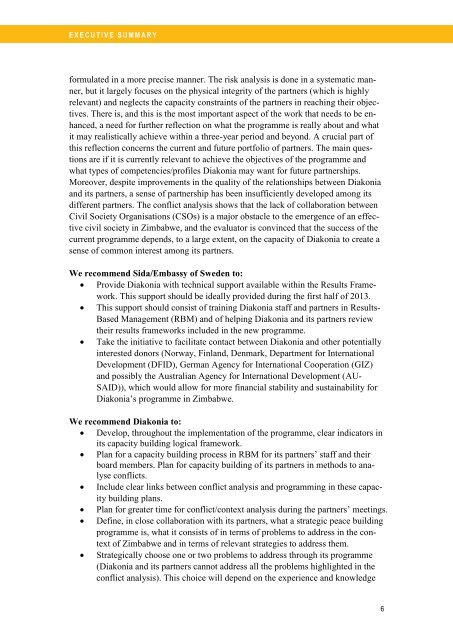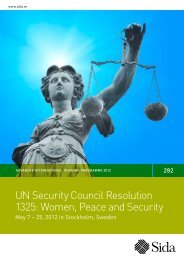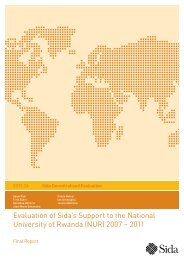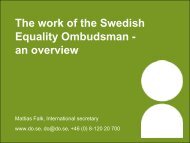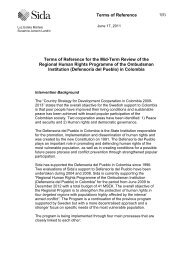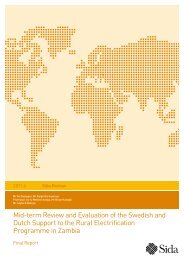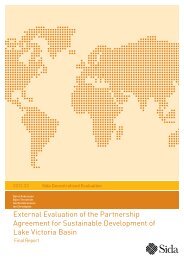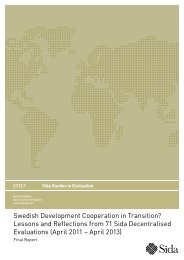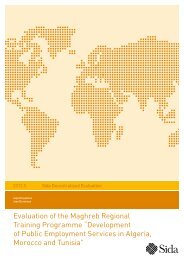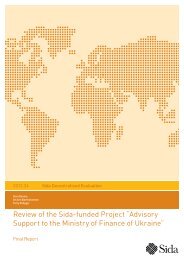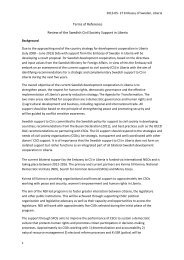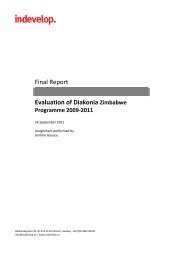Mid-term Review of the Diakonia Strategic Peace Building ... - Sida
Mid-term Review of the Diakonia Strategic Peace Building ... - Sida
Mid-term Review of the Diakonia Strategic Peace Building ... - Sida
Create successful ePaper yourself
Turn your PDF publications into a flip-book with our unique Google optimized e-Paper software.
E X E C U T I V E S U M M A R Y<br />
formulated in a more precise manner. The risk analysis is done in a systematic manner,<br />
but it largely focuses on <strong>the</strong> physical integrity <strong>of</strong> <strong>the</strong> partners (which is highly<br />
relevant) and neglects <strong>the</strong> capacity constraints <strong>of</strong> <strong>the</strong> partners in reaching <strong>the</strong>ir objectives.<br />
There is, and this is <strong>the</strong> most important aspect <strong>of</strong> <strong>the</strong> work that needs to be enhanced,<br />
a need for fur<strong>the</strong>r reflection on what <strong>the</strong> programme is really about and what<br />
it may realistically achieve within a three-year period and beyond. A crucial part <strong>of</strong><br />
this reflection concerns <strong>the</strong> current and future portfolio <strong>of</strong> partners. The main questions<br />
are if it is currently relevant to achieve <strong>the</strong> objectives <strong>of</strong> <strong>the</strong> programme and<br />
what types <strong>of</strong> competencies/pr<strong>of</strong>iles <strong>Diakonia</strong> may want for future partnerships.<br />
Moreover, despite improvements in <strong>the</strong> quality <strong>of</strong> <strong>the</strong> relationships between <strong>Diakonia</strong><br />
and its partners, a sense <strong>of</strong> partnership has been insufficiently developed among its<br />
different partners. The conflict analysis shows that <strong>the</strong> lack <strong>of</strong> collaboration between<br />
Civil Society Organisations (CSOs) is a major obstacle to <strong>the</strong> emergence <strong>of</strong> an effective<br />
civil society in Zimbabwe, and <strong>the</strong> evaluator is convinced that <strong>the</strong> success <strong>of</strong> <strong>the</strong><br />
current programme depends, to a large extent, on <strong>the</strong> capacity <strong>of</strong> <strong>Diakonia</strong> to create a<br />
sense <strong>of</strong> common interest among its partners.<br />
We recommend <strong>Sida</strong>/Embassy <strong>of</strong> Sweden to:<br />
Provide <strong>Diakonia</strong> with technical support available within <strong>the</strong> Results Framework.<br />
This support should be ideally provided during <strong>the</strong> first half <strong>of</strong> 2013.<br />
This support should consist <strong>of</strong> training <strong>Diakonia</strong> staff and partners in Results-<br />
Based Management (RBM) and <strong>of</strong> helping <strong>Diakonia</strong> and its partners review<br />
<strong>the</strong>ir results frameworks included in <strong>the</strong> new programme.<br />
Take <strong>the</strong> initiative to facilitate contact between <strong>Diakonia</strong> and o<strong>the</strong>r potentially<br />
interested donors (Norway, Finland, Denmark, Department for International<br />
Development (DFID), German Agency for International Cooperation (GIZ)<br />
and possibly <strong>the</strong> Australian Agency for International Development (AU-<br />
SAID)), which would allow for more financial stability and sustainability for<br />
<strong>Diakonia</strong>’s programme in Zimbabwe.<br />
We recommend <strong>Diakonia</strong> to:<br />
Develop, throughout <strong>the</strong> implementation <strong>of</strong> <strong>the</strong> programme, clear indicators in<br />
its capacity building logical framework.<br />
Plan for a capacity building process in RBM for its partners’ staff and <strong>the</strong>ir<br />
board members. Plan for capacity building <strong>of</strong> its partners in methods to analyse<br />
conflicts.<br />
Include clear links between conflict analysis and programming in <strong>the</strong>se capacity<br />
building plans.<br />
Plan for greater time for conflict/context analysis during <strong>the</strong> partners’ meetings.<br />
Define, in close collaboration with its partners, what a strategic peace building<br />
programme is, what it consists <strong>of</strong> in <strong>term</strong>s <strong>of</strong> problems to address in <strong>the</strong> context<br />
<strong>of</strong> Zimbabwe and in <strong>term</strong>s <strong>of</strong> relevant strategies to address <strong>the</strong>m.<br />
<strong>Strategic</strong>ally choose one or two problems to address through its programme<br />
(<strong>Diakonia</strong> and its partners cannot address all <strong>the</strong> problems highlighted in <strong>the</strong><br />
conflict analysis). This choice will depend on <strong>the</strong> experience and knowledge<br />
6


